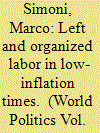| Srl | Item |
| 1 |
ID:
147433


|
|
|
|
|
| Summary/Abstract |
Our paper reconciles the debated literature on the role of the Chinese unions by exploring the heterogeneous effects of unionization on wages in firms with and without political connections. We utilize a survey of 1268 firms in 12 cities to verify our hypothesis that wages increase due to unionization, but this union wage effect is significantly depressed by firms' political connections. Through a detailed analysis of the mechanism behind the empirical results, we conclude that unions increase workers' wages by strengthening the bargaining power of workers, while this bargaining power can be weakened by firms' political connections. Our main conclusion is robust to a series of robustness checks. Moreover, the results from quantile regressions inform us that the union wage effect and the role of political connections may vary along with the firms' wage distribution. Our findings suggest that the solution to further increase wages for low-wage workers and reduce wage inequality is to make the labor union an independent organization which can freely bargain with firms in terms of workers' wages and benefits, rather than an agency subordinate to the government whose role can be affected by the government support and undermined largely by firms' political connections.
|
|
|
|
|
|
|
|
|
|
|
|
|
|
|
|
| 2 |
ID:
119693


|
|
|
|
|
| Publication |
2013.
|
| Summary/Abstract |
This article presents fresh empirical data showing that policy alignment between center-left governments and trade unions was a sustained feature of European politics between 1974 and 2005. This contradicts expectations of a wide delinkage between the electoral left and labor as a consequence of globalization, deindustrialization, and unionization decline. However, structural economic change has altered the policy field so that sustained policy alignment can no longer be explained by existing theoretical frameworks.
Based on a theoretical argument and a multivariate empirical test, the article contends that policy alignment is likelier to occur if labor plays an important role in economic management at the microlevel and the industry level and if unions are politically cohesive agents thanks to powerful confederation leadership supported by democratic decision-making practices. In making its case, the article bridges the literatures on comparative capitalism and party politics, in order to account for change and continuity in policy-making processes
|
|
|
|
|
|
|
|
|
|
|
|
|
|
|
|
| 3 |
ID:
086259


|
|
|
|
|
| Publication |
2009.
|
| Summary/Abstract |
It is widely believed that the unionization of military labor leads to reduced discipline and lower combat capability. Case studies of the performance of existing military unions, however, generally suggest that unionization has a benign impact on the performance of the armed forces. In this paper, we offer a theoretical economic analysis of the likely impact of military unionization on volunteer militaries. Our analysis suggests that military unionization will unambiguously lead to larger, but less disciplined, armed forces, leaving the overall impact of unionization on defense capability ambiguous. Military unionization, however, will clearly enhance social welfare.
|
|
|
|
|
|
|
|
|
|
|
|
|
|
|
|
| 4 |
ID:
147410


|
|
|
|
|
| Summary/Abstract |
This paper studies the inter-correlation among the Communist Party of China (CPC), unionization, and social insurance in a sample of Chinese private firms. We find that both Party branch and unionization are positively associated with insurance coverage. We further present evidence that Party branch and unionization are complements in association with better coverage of social insurance. When the Party–union complementarity is taken into account, Party branch alone is no longer positively associated with social insurance, while the correlation between unionization and insurance declines significantly. Our results suggest that the role of the CPC is overlooked in the literature on labor relations in China.
|
|
|
|
|
|
|
|
|
|
|
|
|
|
|
|